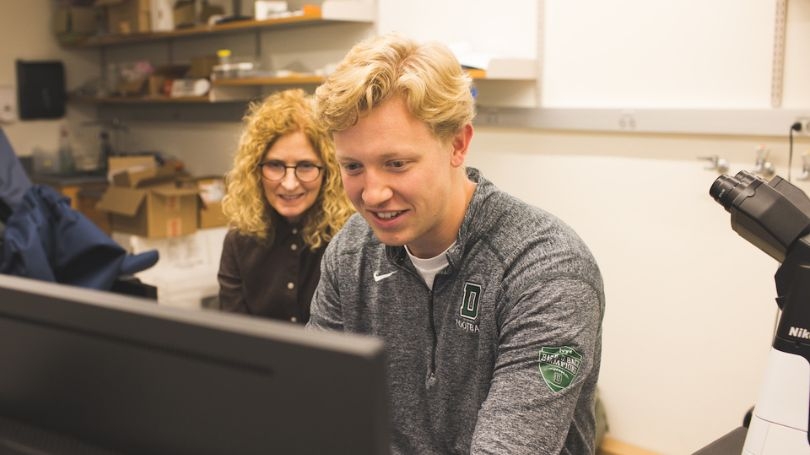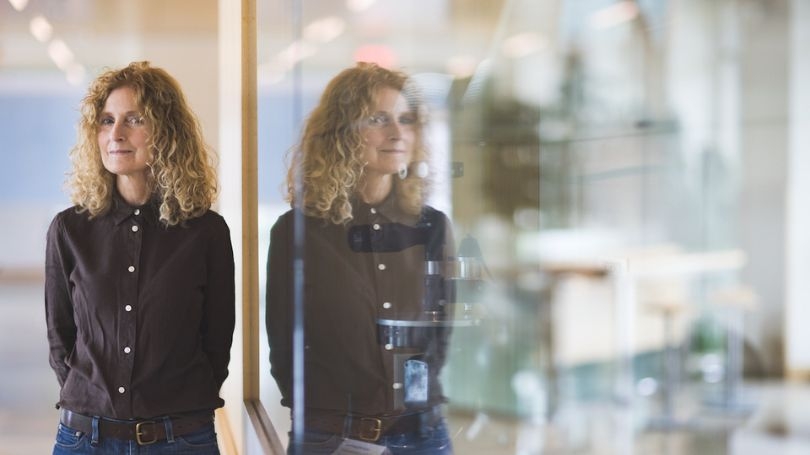

Research support specialist Ann Lavanway's many roles in the biological sciences department include introducing faculty, staff, and students to state-of-the-art microscopes.
This past November, the biological sciences department's Life Sciences Light Microscopy Facility welcomed a new state-of-the-art microscope.
Thanks to a grant secured by molecular and systems biology professor Yashi Ahmed and Assistant Professor of Biological Sciences Bing He, a Nikon SoRa joined the facility's collection of specialized microscopes.
As a research support specialist and manager of the Light Microscopy Facility, Ann Lavanway teaches faculty, students, and staff how to utilize the elite instruments for research projects in biology and ecology. The Nikon dual-camera "super resolution" instrument provides optically sectioned 3D datasets with higher speed than a standard confocal microscope.
Lavanway describes the first six months with a new piece of equipment as a period of intense learning. "We have been figuring out the new software that is used with this microscope," she says. "The Nikon SoRa has a lot of capability and a ton of automation. In order to capture the imaging and collect the data, you need cameras that are very fast and have ways to block out-of-focus light."
In addition to the new Nikon microscope, the facility has two laser scanning confocal microscopes, two spinning disk confocal microscopes, a total internal reflection fluorescence system, and a multi-photon microscope.
"Our facility has very high-tech, high-end microscopes, such as laser-based systems," Lavanways says. "These are microscopes that researchers don't own themselves, which allow them to investigate subcellular structures."
The microscopy facility is housed in the Class of 1978 Life Sciences Center, a state-of-the-art, LEED Platinum-certified building that houses approximately 28 research programs, a Drosophila media kitchen (for making food for fruit flies commonly used in research), an apparatus shop, a 3D printing shop, and a rooftop greenhouse.
"For a smaller-sized institution, Dartmouth has incredible resources," Lavanway says.

Throughout her 30 years at Dartmouth, Lavanway has most enjoyed getting to know the many people she works with in the biological sciences department—faculty, staff, undergraduate students, and graduate researchers. One of her favorite activities is to help newly hired faculty set up their research labs.
"I think the basis of Dartmouth culture is common respect," she says. "Our small community stands out—we are all dedicated to teaching, training, and scholarship. Everyone has a lot to do, every day. We work together to help each other succeed and have a fundamental respect for what it takes to get things done."
On a typical day, Lavanway gives lab tours, performs maintenance on and resolves problems with equipment, manages building access, contributes to the course catalog, and takes care of administrative tasks. She also plays a key role in designing and renovating lab spaces.
"Ann has an uncanny ability to anticipate problems and enact solutions before they become major impediments," says biological sciences professor and department chair Thomas Jack. "She is fully committed to the research and teaching missions of the biology department. Ann is very selfless and prefers to work quietly in the background."
Before coming to Dartmouth in 1993, Lavanway worked as a medical practice manager in Syracuse, NY. After relocating to Hanover, she initially joined the biological sciences department as a lab instructor and worked directly with students. After a few years, Geisel School of Medicine professor of genetics Victor Ambros offered her a research assistant position in his genetics laboratory.
Lavanway joined the lab after the researchers identified the first-known microRNAs in C. elegans, a nematode worm frequently used in genetic research. "It was a very exciting time," Lavanway says.
A few years later, in 2002, biological sciences professor Elizabeth F. Smith (now dean of the Faculty of Arts and Sciences) and Lavanway were awarded an NSF grant to purchase microscopes, and Lavanway returned to the biology department as a research support specialist.
In 2010, Lavanway was awarded the Sheila Culbert Distinguished Employee Service Award, which recognizes a staff member who has made a difference at Dartmouth and demonstrated exemplary work performance and dedication to the institution. Those who nominated Lavanway repeatedly noted her upbeat manner, her willingness to help others, and her superb teaching skills. "I can only hope that I can come back in my next life as smart and effective and organized as Ann Lavanway," one colleague said.
When not tending to prized microscopes, Lavanway can be found exploring local bogs and fens.
"I love wetlands and like to follow my curiosity about the plants and wildlife," she says. "I even grow carnivorous plants on my porch."